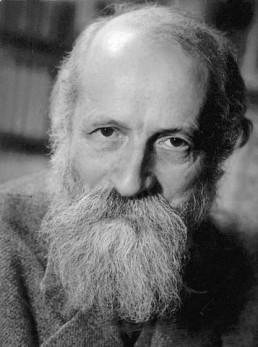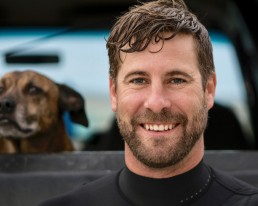I-Ocean: Ideas for a good life from Ethan and Martin
Part 1
In the years I’ve been acquainted with Ethan Crouch, he’s always struck me as a person whose life has exceptional integrity. His broad, bearded smile is quick and welcoming, as optimistic as the the ancient Ford Bronco that waits open-windowed and unlocked while he surfs. He clearly loves riding waves but his habit doesn’t have the smell of escape. He seems just as motivated and fulfilled in the work life that takes up most of his days, and in being a leader in Surfrider, an activist network that occupies another substantial chunk of his time. So many of us believe our lives are built of discreet, even disparate spheres we have to work to balance or, worse, juggle. Not Ethan. It’s one of the reasons I was thrilled he agreed to a Waves to Wisdom interview.
Near the end of our conversation, he cited Martin Buber’s work I and Thou as one of the crucial philosophical influences on his life, not just as an undergraduate studying philosophy, but in his current manifestations as an open hearted but determined activist, a successful business owner, and utterly stoked surfer. Listening to our interview, you know Ethan Crouch works hard. You hear the joy he derives from what he calls his foundational practice of finding connection through surfing. Ethan has spent his adult life building on that practice and, in the process, found integrated connection with his community, his values, and his life path.
From my perspective, a crucial part of the Waves to Wisdom project is learning from the nimble, creative, open-minded acceptance that surfing demands. Building on those wave-born habits when I’m dry and landlocked, I look for ways to offer to others what I glean from these hard won lessons. That means staying open to any wisdom that surfaces from the waves and this last interview left me feeling like Martin Buber was, clearly, calling.
Part of the clarity arose from the familiarity of Buber’s name. Martin Buber has been a favorite of some of the most brilliant, passionate, and loving members of the community of Quaker-influenced educators and students I worked among for 17 years. It was among this group that it first occurred to me that perhaps I needn’t be afraid of Christians, a prejudice I feel mostly freed from. To be clear, Buber was Jewish but his work is perpetually popular among a subset of Protestants, including many Quakers.
My own spiritual orientation is somewhere in the neighborhood of aspiring animism although, like almost every single other person I know, or have ever known, I’m culturally, hopelessly monotheistic — forever looking for the one true source or method or path toward truth. It took me a long time to really feel the wisdom of what I believe Ethan means when he says that truth is like water, when you try to hold it in your hands it just squeezes out.
I knew Buber might be a challenge for me but I hoped I’d be open enough to learn what Ethan found so powerful and, perhaps, find something I could keep and then share. Some enduring practice or pattern in his ideas about the sacred and how to cultivate it in our workaday lives. After all, that sort of habit, of nurturing the capacity for powerful connection to perspective and purpose is precisely the point of Waves to Wisdom.
Plus there was Ethan. His business’s LinkedIn page reports that they have a “passion for scheduling.” In my mind, passion and scheduling go together like hot fudge and scaffolding… huh? I had things to learn. This fellow student of salt spray clearly has some priorities figured out and if Buber helped him get there, I wanted in on it.
I took a deep dive into this difficult little book, I and Thou, and will post something more substantial about in a couple of days. In the meantime, I can recommend it to anyone who’s interested in being challenged by ideas and language that is perplexing, beautiful, and occasionally revelatory. I was grateful for my own late life capacity to accept that Buber’s explicitly religious language might offer something of relevance to my own ocean-centered existence and passion for providing inspiration and guidance to others.
According to Buber’s translator, Walter Kaufmann, one of Buber’s accomplishments is endowing the social sphere with a sacred dimension. It doesn’t take much mental steam to see that our social sphere could use a lot more of that dimension right now. A great book is a great teacher and, as is that case with all the great teachers, the subject of the lesson is life.
Kaufmann writes:
“A good book or essay or poem is not primarily an object to be put to use, or an object of experience, it is the voice of You speaking to me, requiring a response.” (p.39)
This “You” is sacred and, in some sense, divine. Some might even say it’s God. I wouldn’t, and it was a bit of a struggle for me when Buber did. Kaufmann acknowledges that it might be better not to use religious terms “because they are always misunderstood,” and then issues an assignment.
“We need a new language, and new poets to create it, and new ears to listen to it. Meanwhile, if we shut our ears to the old prophets who still speak more or less in old tongues…we shall have very little music… Let him that has new ears listen to it in a new way.” (p.31)
More than any other force in my life, the ocean has offered me new ears.
I’m listening.





